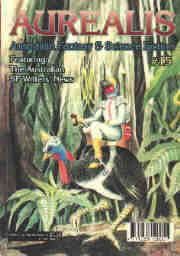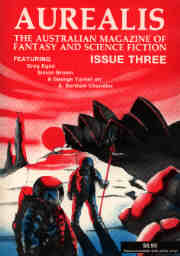Aurealis #179
$3.99
In this issue:
- Goodbye Lucy—Rosanna Watts
- Context—Stephen Higgins
- How Grandpa Bear Saved Old Oak From Fire—Ben Blattberg
- The Funny Thing About Kobolds—Annie Mills
- Weaving in the Humour: To Say Nothing of the Dog—Roger Leigh
- Reimagining Ability: Disability in Speculative Fiction—Rebecca Langham
- Reviews of the latest SFF releases
- From the Cloud — Dirk Strasser
- Goodbye Lucy — Rosanna Watts
- Context — Stephen Higgins
- How Grandpa Bear Saved Old Oak From Fire — Ben Blattberg
- The Funny Thing About Kobolds — Annie Mills
- Weaving in the Humour: To Say Nothing of the Dog — Roger Leigh
- Reimagining Ability: Disability in Speculative Fiction — Rebecca Langham
To finish off my retrospective on the origin and early years of the Aurealis Awards in the year of their 30th anniversary, I wanted to touch on the Awards’ centrepiece, the ceremonies. In most years, the ceremony was the most expensive part of the awards and the one thing that had the potential to cause the most stress as well as the greatest enjoyment.
The Aurealis Awards always ran on a tight (or effectively no) budget. The editors of the magazine could give their time, but Aurealis wasn’t in a position to put funds into the Awards. I would say we ran the Awards on a shoestring, but it wouldn’t be accurate because even shoestrings cost something.
There was one exception to this. The magazine had a reasonably good year in 2000, and I had decided, for workload reasons, I couldn’t continue doing the day-to-day organisation of the awards, so we splashed out and put quite a bit of money into the last Awards ceremony we would be running. It was a fully catered affair at Borders Bookshop in Prahran on 2 March 2001, where food and drink was served, cocktail style, before and after the event. It was fully funded by Chimaera Publications (the publishers of Aurealis) and free to attend.
This was the year that it had first become obvious that the awareness of the Aurealis Awards had outstripped awareness of Aurealis magazine, and I mentioned this in my opening speech. One of my other remarks was that this was a year when we offered to reimburse the authors for the costs of mailing books among themselves, but none of them took us up on it. Which says a great deal about the support that the awards had.
What I remember most clearly, though, as I went through my opening remarks was a sense of panic that the first scheduled Award-winner Damien Broderick hadn’t arrived yet. There would be nothing more deflating than announcing the first winner and no one was there to accept the award. So, I shuffled the order of the announcements on the fly to give him time to show up. The problem was the place was packed and it was standing room only, so no matter how much I scanned the crowd, I couldn’t see if he had arrived. Finally, someone told me they had spotted him and I went on to announce his win.
The night was a success with many more people than I estimated showing up, and I remember at the end of the night arguing with the bookstore that our arrangement had been based on a fixed amount of food and drink, not the number of people. The organiser of the venue said they had counted the attendance and were charging me considerably more than we had agreed. The Borders Events person who I had agreed the fee with wasn’t there but, needless to say, I didn’t pay the extra. It would have bankrupted the magazine. And the night ended on a nice note when Damien Broderick told me how impressed he was with the event. I was glad that, for once, we could treat the SFF community and not do the ceremony on a less-than-a-shoestring budget.
From that day, others took up the mantle and I stepped back. Chimaera Publications’ long-term aim was to ensure the continuity of the awards, but not to get involved in the day-to-day running. My job was to ensure that the Aurealis Awards were in safe hands and, when one organisation stepped back from running the awards, I would find a replacement. I’ve always thought that the people doing the hard work should be given fairly free reign to go about it the way they wished. The result has been the Awards have remained dynamic over the years, with each new group taking over after a three-or-more year period, making changes and bringing in a fresh wave of enthusiasm.
Organising the Awards ceremonies was never my favourite part of the job. However, despite the hassle and stress associated with organising the ceremonies, seeing the pure joy on the face of a winner—particularly one who had convinced themselves they had no chance—always made it worthwhile.
While the Aurealis Awards started out as Melbourne-based, they became fully national, with the Awards ceremony moving around the country. To date, it’s been in Melbourne 8 times, Brisbane 7, Canberra 4, Sydney 3, Perth 3, Adelaide 1, and online twice. After my Borders swansong, for the next three years Peter McNamara, Keith Stevenson and then Swancon took on the ceremony organisation. This was followed by a long stint in Queensland by Richard Pitchforth and Fantastic Queensland and then to Sydney by Nathan Burrage and Specfaction NSW. And, of course, for many years now, Tehani Croft has been the mainstay of the Aurealis Awards, and her tireless behind-the-scenes efficiency has kept them running smoothly for years, driving them forward with enthusiasm and innovation. My attendance at the Awards ceremonies in recent years has, sadly, been more spasmodic due to various commitments.
I’ll definitely be there this year!
Make sure you keep up with the announcements about the Aurealis Awards 30-year celebration.
All the best from the cloud!
Dirk Strasser
From Goodbye Lucy by Rosanna Watts:
Lucy is already waiting for me, but there’s no point in rushing. I step out of the tube into Flinders Street underground and head for the old station exit, ignoring all the signs for the different shopping and entertainment districts. I take the two escalators, bridging the underground city to the old one. I’m the only one going up. Everyone is going down to experience, as the catchphrase puts it, down under, underground. But I’m going up to experience, as an internet meme once put it, down under, rundown.
From Context by Stephen Higgins:
Kelli Banks deftly opened her car door and slung her bag onto the back seat. In one fluid movement, she slid into the driver’s seat, started the car and secured her seat belt. One quick glance at the rear-view mirror, followed by a look at her side mirror, told her that she was clear to go. She drove straight into a middle-aged man. Kelli was surprised that there was no accompanying sound.
From How Grandpa Bear Saved Old Oak From Fire by Ben Blattberg:
Oh, my darling cubs, I hear you whisper that Grandpa Bear is no true bear, that his metal paw makes him a human thing that does not belong in Old Oak Pact. Know this—you cubs with your teeth still stained with milk—no metal paw could make Grandpa Bear a human thing.
From The Funny Thing About Kobolds by Annie Mills:
Even in the biggest, most well-known and commonly-used fantasy races, there’s usually some difference in how different works of fictions from varying creators, times and places portray fantastical beings. Are goblins and orcs green, or not? Do dwarfs all have beards, or just the males? Just how pointy are elves’ ears, anyway? But there’s one race that has a particularly weird amount of variation in what form they take in fiction: kobolds.
From Weaving in the Humour: To Say Nothing of the Dog by Roger Leigh:
You know those old friends you haven’t seen since forever and keep meaning to call? Then you finally catch up and you talk and you argue and you laugh, and it’s like you were never apart. Connie Willis’ sixth novel, To Say Nothing of the Dog (1997), feels like that.
From Reimagining Ability: Disability in Speculative Fiction by Rebecca Langham:
Too often in mainstream narratives, disability is reduced to a source of tragedy or a temporary obstacle for an able-bodied hero to overcome. Speculative fiction, however, has the potential to offer more complex.





